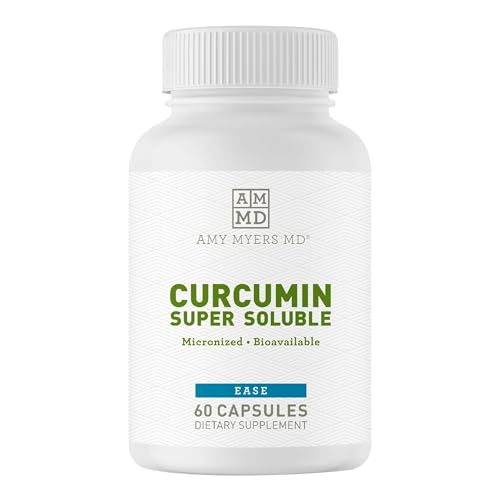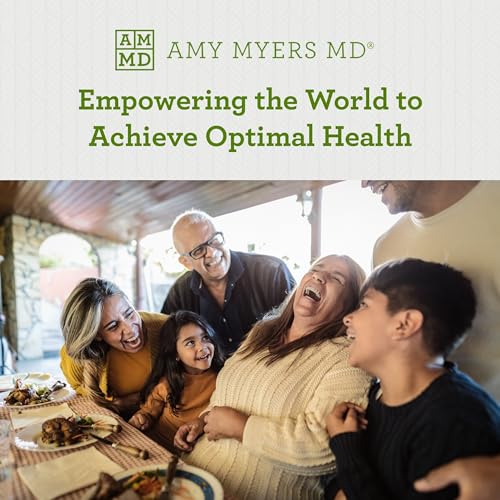

Dr. Amy Myers Mushroom Supplement - Gut & Liver Health Support, Non-GMO, 60 Capsules


Calcium
Medium RiskCalcium is a chemical element commonly found in various compounds and is essential for biological functions, particularly in bone health and cellular processes. It is utilized in products for its role in maintaining structural integrity and as a dietary supplement.
Sustai Insights
Calcium offers functional benefits such as supporting bone health and acting as a buffering agent in formulations. While generally safe, it presents moderate allergenic potential and concerns regarding persistence and bioaccumulation in the environment. Regulatory bodies have minimal restrictions, indicating a low risk for carcinogenicity and developmental toxicity. Safe usage practices should be adhered to, especially for sensitive populations. Alternatives like plant-based calcium sources may be considered for those seeking sustainable options. Overall, the risk level associated with calcium is assessed as medium.
Ascorbyl Palmitate (Vitamin C Palmitate)
Low RiskAscorbyl palmitate, also known as vitamin C palmitate, is a compound formed by the esterification of ascorbic acid (vitamin C) and palmitic acid. It is primarily used in cosmetic and food products for its antioxidant properties and as a stabilizer for formulations containing fats and oils.
Sustai Insights
Ascorbyl palmitate offers functional benefits as an antioxidant, contributing to product stability and potentially enhancing skin health. It is generally regarded as safe, with low concerns regarding carcinogenicity, allergies, and reproductive toxicity. However, there are considerations regarding biochemical changes at a cellular level, and while it poses minimal environmental risks, it is essential to follow regulatory guidelines. Overall, the risk level is low, making it a suitable ingredient in various applications. Alternatives include other antioxidants like tocopherols for similar benefits.
Sand
Low RiskSand is loose, granular particles of worn or disintegrated rock, primarily composed of silica. It is commonly used as an abrasive, filler, or in construction and landscaping for its structural properties.
Sustai Insights
Sand offers functional benefits such as providing bulk and texture in various products, and it is generally considered to have low health risks, with minimal concerns regarding carcinogenicity, allergies, or reproductive toxicity. Environmentally, sand does not contribute significantly to pollution and is not bioaccumulative. Regulatory bodies do not impose restrictions on sand usage, maintaining its low-risk status. Safe usage practices should be followed to avoid inhalation of fine particles. Overall, sand is a low-risk ingredient with no notable negative impacts.
Dicalcium Phosphate Dihydrate
Low RiskDicalcium phosphate dihydrate is an inorganic compound commonly used in cosmetics and food products as a source of calcium and phosphorous. It functions primarily as a bulking agent, anti-caking agent, and nutritional supplement, contributing to the overall formulation stability and effectiveness.
Sustai Insights
Dicalcium phosphate dihydrate offers functional benefits, such as enhancing product texture and providing essential minerals. It poses low health risks, with negligible concerns regarding carcinogenicity, allergies, and reproductive toxicity. Environmental impact is minimal, with no significant pollutant potential. Regulatory bodies do not impose restrictions on its use. Overall, the ingredient is assessed to have a low risk, making it a suitable choice in various applications.
Cellulose
Low RiskCellulose is a natural polysaccharide derived from plant cell walls, primarily used as a thickening agent, stabilizer, and emulsifier in cosmetic formulations. It is known for its ability to improve texture and consistency in products.
Sustai Insights
Cellulose serves as an effective thickening and stabilizing agent, enhancing product texture while being biodegradable and derived from renewable sources. Health risks are minimal, with low concerns regarding carcinogenicity, allergies, and reproductive toxicity. Environmental impacts are also low, as cellulose does not contribute significantly to pollution or bioaccumulation. Regulatory agencies have not issued restrictions on its use. Overall, cellulose presents a low risk profile, making it a suitable ingredient choice in cosmetics.
Ascorbyl Palmitate (Vitamin C Palmitate)
Low RiskAscorbyl palmitate, also known as vitamin C palmitate, is a compound formed by the esterification of ascorbic acid (vitamin C) and palmitic acid. It is primarily used in cosmetic and food products for its antioxidant properties and as a stabilizer for formulations containing fats and oils.
Sustai Insights
Ascorbyl palmitate offers functional benefits as an antioxidant, contributing to product stability and potentially enhancing skin health. It is generally regarded as safe, with low concerns regarding carcinogenicity, allergies, and reproductive toxicity. However, there are considerations regarding biochemical changes at a cellular level, and while it poses minimal environmental risks, it is essential to follow regulatory guidelines. Overall, the risk level is low, making it a suitable ingredient in various applications. Alternatives include other antioxidants like tocopherols for similar benefits.
Sand
Low RiskSand is loose, granular particles of worn or disintegrated rock, primarily composed of silica. It is commonly used as an abrasive, filler, or in construction and landscaping for its structural properties.
Sustai Insights
Sand offers functional benefits such as providing bulk and texture in various products, and it is generally considered to have low health risks, with minimal concerns regarding carcinogenicity, allergies, or reproductive toxicity. Environmentally, sand does not contribute significantly to pollution and is not bioaccumulative. Regulatory bodies do not impose restrictions on sand usage, maintaining its low-risk status. Safe usage practices should be followed to avoid inhalation of fine particles. Overall, sand is a low-risk ingredient with no notable negative impacts.
Dicalcium Phosphate Dihydrate
Low RiskDicalcium phosphate dihydrate is an inorganic compound commonly used in cosmetics and food products as a source of calcium and phosphorous. It functions primarily as a bulking agent, anti-caking agent, and nutritional supplement, contributing to the overall formulation stability and effectiveness.
Sustai Insights
Dicalcium phosphate dihydrate offers functional benefits, such as enhancing product texture and providing essential minerals. It poses low health risks, with negligible concerns regarding carcinogenicity, allergies, and reproductive toxicity. Environmental impact is minimal, with no significant pollutant potential. Regulatory bodies do not impose restrictions on its use. Overall, the ingredient is assessed to have a low risk, making it a suitable choice in various applications.
Cellulose
Low RiskCellulose is a natural polysaccharide derived from plant cell walls, primarily used as a thickening agent, stabilizer, and emulsifier in cosmetic formulations. It is known for its ability to improve texture and consistency in products.
Sustai Insights
Cellulose serves as an effective thickening and stabilizing agent, enhancing product texture while being biodegradable and derived from renewable sources. Health risks are minimal, with low concerns regarding carcinogenicity, allergies, and reproductive toxicity. Environmental impacts are also low, as cellulose does not contribute significantly to pollution or bioaccumulation. Regulatory agencies have not issued restrictions on its use. Overall, cellulose presents a low risk profile, making it a suitable ingredient choice in cosmetics.
Calcium
Medium RiskCalcium is a chemical element commonly found in various compounds and is essential for biological functions, particularly in bone health and cellular processes. It is utilized in products for its role in maintaining structural integrity and as a dietary supplement.
Sustai Insights
Calcium offers functional benefits such as supporting bone health and acting as a buffering agent in formulations. While generally safe, it presents moderate allergenic potential and concerns regarding persistence and bioaccumulation in the environment. Regulatory bodies have minimal restrictions, indicating a low risk for carcinogenicity and developmental toxicity. Safe usage practices should be adhered to, especially for sensitive populations. Alternatives like plant-based calcium sources may be considered for those seeking sustainable options. Overall, the risk level associated with calcium is assessed as medium.
Discover Dr. Amy Myers Turmeric Curcumin Super Soluble 500mg, a powerful dietary supplement designed for gut and liver health. This supplement harnesses the benefits of BCM-95 curcumin to support your wellness journey.
- Gut Health Support: Crafted to enhance gut lining and intestinal health, promoting optimal digestion and comfort.
- High Bioavailability: Features BCM-95 curcumin, standardized to 86% curcuminoids for superior absorption and effectiveness.
- Liver Function Boost: Designed to support liver health; recommended dosage is 1 capsule twice daily.
- Allergen-Free Formula: Non-GMO and free from artificial sweeteners, soy, gluten, dairy, and eggs, making it suitable for various dietary needs.
- Empowering Health Solutions: This supplement aims to educate and empower individuals to take charge of their health naturally.
Elevate your wellness routine with a supplement that prioritizes health and sustainability, all while supporting your body's natural functions.
Subscribe & Save with Sustai
- Best Price Guarantee: Always enjoy the lowest prices on sustainable home essentials.
- No Surprises: We’ll notify you before shipping. No hidden fees, ever.
- You’re in Charge: Change, pause, or cancel your subscription anytime with ease.
- Eco-Friendly Deliveries: Our grouped shipments mean less packaging and lower emissions.
Join us on a sustainable journey. Special offers for a limited time! Prices and promotions may change.
Recommended Products
Discover Dr. Amy Myers Turmeric Curcumin Super Soluble 500mg, a powerful dietary supplement designed for gut and liver health. This supplement harnesses the benefits of BCM-95 curcumin to support your wellness journey.
- Gut Health Support: Crafted to enhance gut lining and intestinal health, promoting optimal digestion and comfort.
- High Bioavailability: Features BCM-95 curcumin, standardized to 86% curcuminoids for superior absorption and effectiveness.
- Liver Function Boost: Designed to support liver health; recommended dosage is 1 capsule twice daily.
- Allergen-Free Formula: Non-GMO and free from artificial sweeteners, soy, gluten, dairy, and eggs, making it suitable for various dietary needs.
- Empowering Health Solutions: This supplement aims to educate and empower individuals to take charge of their health naturally.
Elevate your wellness routine with a supplement that prioritizes health and sustainability, all while supporting your body's natural functions.

You can have at most 2 Sustainable Steals products in your cart
Customer Reviews
Customers’ View
Customers generally appreciate the effectiveness and quality of the Turmeric Curcumin Supplement. Many users note its potential benefits for gut and liver health, with one reviewer stating it may help with inflammation issues. The enhanced absorption capability of the BCM-95 curcumin is highlighted positively, with some users feeling it provides better results compared to other turmeric supplements they have tried. Additionally, the allergen-friendly formulation, which is non-GMO and free from common allergens, resonates well with health-conscious consumers. However, some customers express concerns about the product's price and absorption issues, suggesting that while it has its strengths, it may not meet everyone's expectations. Overall, this supplement is viewed as a high-quality option for those seeking to support their wellness journey.
AI-generated from the text of customer reviewsThis product has no reviews yet.




